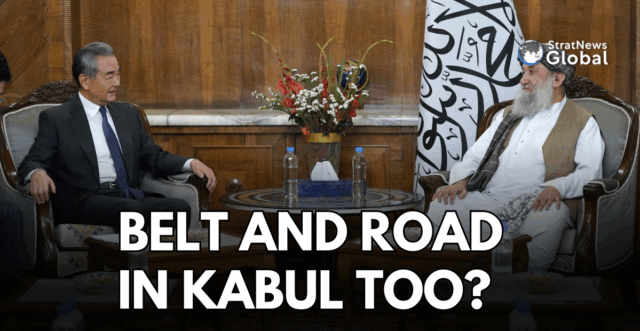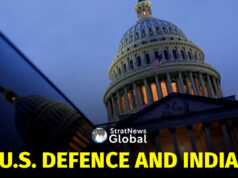Chinese Foreign Minister Wang Yi visited Kabul on Tuesday, holding talks with senior Taliban leaders on trade, security, and regional cooperation, in the latest leg of a regional tour that took him from New Delhi to Afghanistan and onwards to Islamabad.
Wang arrived in Kabul after chairing a meeting of special representatives on the India–China border issue in New Delhi. During his visit there, he handed Prime Minister Narendra Modi an invitation from President Xi Jinping to attend the upcoming Shanghai Cooperation Organisation (SCO) summit, which Modi accepted.
In Kabul, Wang met Afghan Foreign Minister Mawlawi Amir Khan Muttaqi, Prime Minister Mullah Muhammad Hassan Akhund, and Interior Minister Khalifa Sirajuddin Haqqani.
The visit also coincided with the Sixth Trilateral Foreign Ministers Dialogue in Kabul, attended by Wang Yi, Pakistani Foreign Minister Ishaq Dar, and Afghan Foreign Minister Muttaqi. The three sides reaffirmed their commitment to joint efforts against terrorism, deepening trade and transit ties, combating drug trafficking, and extending the multibillion-dollar China–Pakistan Economic Corridor (CPEC) to Afghanistan.
Muttaqi described relations with China as “progressing” and noted annual trade had reached one billion dollars. He proposed expanding cooperation in transportation, banking, and trade balance, urging intergovernmental commissions to intensify technical discussions. He also reiterated that Afghan soil would not be used against neighbors.
Wang Yi said Afghanistan would be officially included in the Belt and Road Initiative and expressed interest in mineral exploration and extraction, with practical mining operations expected to start this year. He pledged political and economic support and said barriers to Afghan agricultural exports would be removed.
Prime Minister Akhund said the Islamic Emirate had resolved many challenges since taking power and sought “sustainable and positive relations” with all countries, including China.
Interior Minister Haqqani welcomed Wang Yi, describing Afghanistan–China relations as “historic” and noting that China had always maintained positive engagement. Wang responded that ties had “deep roots in history.” Their talks covered security, narcotics control, border coordination, agriculture, trade, and training programs.
Wang, calling China’s friendship “sincere and steadfast,” noted he was the only foreign minister among the permanent members of the UN Security Council to have visited Afghanistan twice. He stressed the importance of security cooperation as a foundation for development and urged Afghan authorities to address China’s concerns.
Both in bilateral and trilateral settings, Afghan leaders assured that Afghan territory would not be used to threaten others.
Pakistan’s foreign office said Wang is visiting Islamabad at the invitation of foreign minister Dar to co-chair the sixth Pakistan-China foreign ministers’ strategic dialogue on August 21.
In a career spanning three decades and counting, Ramananda (Ram to his friends) has been the foreign editor of The Telegraph, Outlook Magazine and the New Indian Express. He helped set up rediff.com’s editorial operations in San Jose and New York, helmed sify.com, and was the founder editor of India.com.
His work has featured in national and international publications like the Al Jazeera Centre for Studies, Global Times and Ashahi Shimbun. But his one constant over all these years, he says, has been the attempt to understand rising India’s place in the world.
He can rustle up a mean salad, his oil-less pepper chicken is to die for, and all it takes is some beer and rhythm and blues to rock his soul.
Talk to him about foreign and strategic affairs, media, South Asia, China, and of course India.





